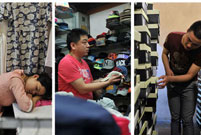 10 low-carbon tips to save money
10 low-carbon tips to save money
 Luxury cars make Asia premiere at Auto China
Luxury cars make Asia premiere at Auto China
 Versatile dog
Versatile dog
 Ni Ni covers BAZAAR JEWELRY
Ni Ni covers BAZAAR JEWELRY
 Cherry blossoms reach peak bloom in Washington D.C.
Cherry blossoms reach peak bloom in Washington D.C.
 Top Chinese fashion icons in foreigners' eyes
Top Chinese fashion icons in foreigners' eyes
 Asia's largest business aviation exhibition to be held in Shanghai
Asia's largest business aviation exhibition to be held in Shanghai
 World's top-rated luxury hotels
World's top-rated luxury hotels
 Wu Jing, Xie Nan to hold wedding on May
Wu Jing, Xie Nan to hold wedding on May
 London Cake International attracts tourists
London Cake International attracts tourists
JINDO, South Korea, April 23 -- Li Daonan, a 39-year-old Chinese passenger, expected his sea trip from South Korea's western port city of Incheon to the southern resort island of Jeju to be nothing but usual.
A heavy fog had filled the sky above Incheon on the evening of April 15. Many ships delayed their departures, including the 6,825-ton Sewol ferry that carried Li and his vehicle, but this could happen to any other sea voyage.
At one moment, Li did consider returning his ticket for a refund, but he did not. He told his mother in a text message that he chose to take the trip as planned as his car had already been taken aboard the ferry and could not be unloaded.
"Mum, rest assured that we set off," Li then said in a call to his mother as he headed off for his holiday.
Li's decision to stay on the ferry changed his fate forever. The next morning, Sewol capsized in icy waters off Jindo Island with a total of 476 passengers and crew aboard.
In what could be South Korea's worst maritime disaster in two decades, at least 150 people, including Li and another Chinese man, 47-year-old Li Xianghao, have been confirmed dead, with another 152 people still missing as of Wednesday afternoon.
The Chinese embassy has said two other female Chinese passengers, including a middle school student, were still missing.
Li Xianghao had planned to take a job on Jeju.
"I have some stuff to do and will take a ship," he said in a text message to his elder brother Li Taihao.
"Take care and be safe," his brother replied.
Li Xianghao's text messages turned out to be his last words to his families.
About one week later, Li Daonan's mother, who had arrived in Jindo shortly after getting the news of the disaster, anxiously asked around for clues to his son's whereabouts. Her shoes finally got broken.
After talking to rescuers, she then hurried to Mokpo Saean Hospital in a pair of plastic slippers, only to see her son lying on a stretcher in the clothes he was wearing when he left her.
"Yes, he's my son," the 62-year-old woman told medical workers. She managed to stand only after being supported by two people.
"How could my son, such a smart boy, have lost his life?" she murmured repeatedly while waiting for the DNA identification process.
The staff helped her sort out her son's belongings, a cell phone and a wallet. She carefully put them in her handbag.
Li Taihao, the elder brother of drowned Li Xianghao, did not know the ferry his brother was on had capsized until he received a call on April 16. Since then, he had waited day and night for any news in Paengmok Port, Jindo, 25 km away from the scene of the accident.
Six days later, the South Korean coast guard told Li Taihao that they had found his brother's body.
Li Taihao transported his brother's body overnight to the capital of Seoul.
"I just want my brother to go back home as early as possible," he said.
For the relatives of the two missing Chinese passengers, every hour went by with increasing desperation as rescue efforts were hampered by bad weather and fast sea currents.
Han Yingji, whose sister Han Jinji was one of the two missing Chinese female passengers, first saw the news about the sunken ferry on TV. She had a bad feeling. She knew her sister had got aboard the ill-fated ship.
She then tried to call her sister, but no one answered. In the following days, she redialled the number several times a day, unable to fully grasp the fact that her beloved younger sister could be among the dead.
After arriving in Jindo, the exhausted 51-year-old ethnic Korean with Chinese citizenship waited in a makeshift shed put up for relatives of the missing passengers.
On the ground around her were blankets and clothes offered by volunteers. She was desperate for any news about her sister.
Every day in Jindo was torturous for her. Every couple of minutes, she went to see if there was any update about the list of victims. She could barely sleep at night. One day, she fainted and was sent to a hospital.
"To whom can I express these sufferings?" she said, raising her arms, bruised from fluid infusion. She then wiped off tears from her cheeks.
Despite her frail health, She insisted on staying in the shed, braving strong winds and cold rains in the night. She said she felt it was nearer to her sister.
Han Yingji is 13 years older than her missing sister and loves her dearly. On a Sunday before the accident, the sisters had dinner together at home. Han Yingji cooked dumplings made of rice, her sister's favorite.
In Han Yingji's eyes, her sister was a gentle and quiet person. In 2004, Han Jinji came to South Korea and began to work in an electronic equipment factory in Ansan, near Seoul.
Han Jinji used to work for several consecutive months, without resting for so much as a day. Taking the Sewol ship was Han Jinji's first trip this year.
"I always have hope," Han Yingji said. "How lucky would it be if my sister were saved by fishermen on the islands in the sea?"
 Commando elite specializes in sign language
Commando elite specializes in sign language Man photoshops himself into girlfriend's childhood photos
Man photoshops himself into girlfriend's childhood photos Photo story: Stallholders at Beijing Zoo Wholesale Market
Photo story: Stallholders at Beijing Zoo Wholesale Market Artists on backstage
Artists on backstage Beckham launches fund to support youth soccer in China
Beckham launches fund to support youth soccer in China Cherry blossoms hit peak bloom in Washington D.C.
Cherry blossoms hit peak bloom in Washington D.C. Children in ancient costumes learn Zhusuan
Children in ancient costumes learn Zhusuan Tens of thousands celebrate Water Splashing Festival
Tens of thousands celebrate Water Splashing Festival A bite of China II whets the appetite
A bite of China II whets the appetite Richest Chinese of 2014: half from the mainland
Richest Chinese of 2014: half from the mainland Chengdu - laid-back lifestyle makes happiest city
Chengdu - laid-back lifestyle makes happiest city The backstage of the Fashion Week
The backstage of the Fashion Week College students in Han costumes
College students in Han costumes Postgraduate works as waitress
Postgraduate works as waitress Life in a Lahu village in Yunnan
Life in a Lahu village in YunnanDay|Week|Month